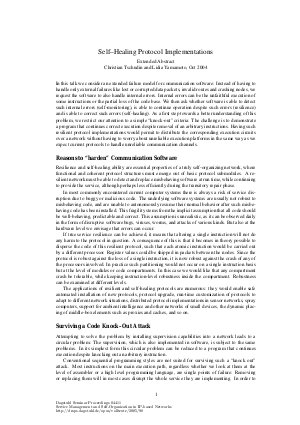Self-Healing Protocol Implementations
Authors Christian Tschudin, Lidia Yamamoto
-
Part of:
Volume:
Dagstuhl Seminar Proceedings, Volume 4411
Part of: Series: Dagstuhl Seminar Proceedings (DagSemProc) - License:
 Creative Commons Attribution 4.0 International license
Creative Commons Attribution 4.0 International license
- Publication Date: 2005-03-24
File

PDF
DagSemProc.04411.16.pdf
- Filesize: 56 kB
- 2 pages
Document Identifiers
Subject Classification
Keywords
- resilient protocol implementations
- autonomic communication systems
- active networking
- bio-inspired networking
Metrics
- Access Statistics
-
Total Accesses (updated on a weekly basis)
0Document
0Metadata
Abstract
Current studies on self-configuring and adaptive networks aim at developing specific and fixed protocols which are able to optimize their configuration in a variable network environment. In this talk we study the problem where the protocols need to cope with a defective execution, including the lossy execution or the injection of foreign code. One guiding question will be the creation of robust execution circuits which can distribute over a network and which continue their service despite parts of the implementation being knocked out. The ultimate goal is to enable protocol implementations to detect by themselves that they are malfunctioning and to let them correct their own operation mode and code base. As a show case, we present a protocol implementation which is robust against deletion (knock-out) of any single instruction, regardless whether this deletion affects the core protocol functionality or the resilience logic. The technique used in this first of its kind example is the self-modification of the running program, which can be naturally situated in an active networking context. Ultimately, a self-correcting protocol implementation has to constantly rewrite itself according to the (self-)observed performance. In this talk we will also point to related fields like self-correcting software, fault tolerant quantum computing and self-healing properties of biological systems. This is joint work with Lidia Yamamoto, Hitachi Europe.
Cite As Get BibTex
Christian Tschudin and Lidia Yamamoto. Self-Healing Protocol Implementations. In Service Management and Self-Organization in IP-based Networks. Dagstuhl Seminar Proceedings, Volume 4411, pp. 1-2, Schloss Dagstuhl – Leibniz-Zentrum für Informatik (2005)
https://doi.org/10.4230/DagSemProc.04411.16
BibTex
@InProceedings{tschudin_et_al:DagSemProc.04411.16,
author = {Tschudin, Christian and Yamamoto, Lidia},
title = {{Self-Healing Protocol Implementations}},
booktitle = {Service Management and Self-Organization in IP-based Networks},
pages = {1--2},
series = {Dagstuhl Seminar Proceedings (DagSemProc)},
ISSN = {1862-4405},
year = {2005},
volume = {4411},
editor = {Matthias Bossardt and Georg Carle and D. Hutchison and Hermann de Meer and Bernhard Plattner},
publisher = {Schloss Dagstuhl -- Leibniz-Zentrum f{\"u}r Informatik},
address = {Dagstuhl, Germany},
URL = {https://drops.dagstuhl.de/entities/document/10.4230/DagSemProc.04411.16},
URN = {urn:nbn:de:0030-drops-986},
doi = {10.4230/DagSemProc.04411.16},
annote = {Keywords: resilient protocol implementations , autonomic communication systems , active networking , bio-inspired networking}
}
